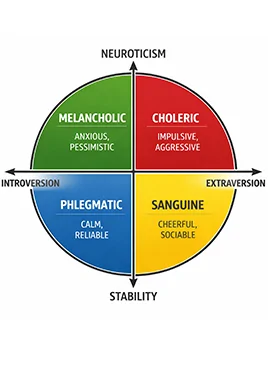What is the difference between temperament and character?
Temperament refers to the innate biological properties of your nervous system (reaction speed, sensitivity threshold). Character is formed throughout life under environmental influence. Temperament is the "foundation" that remains stable throughout your life.
Can temperament change during one's lifetime?
The biological basis of temperament is unchanging. However, a person can develop self-regulation skills. For example, an impulsive choleric person can learn to restrain reactions, but their nervous system will still react faster than that of a phlegmatic person.
Does a high level of neuroticism mean I am mentally unwell?
No. In Eysenck's methodology, neuroticism is simply an indicator of emotional sensitivity and the reactivity of the nervous system. People with high neuroticism are often more empathetic and attentive to detail; it is not a sign of illness.
Does knowing your temperament help in career choice?
Yes. Knowing your type helps you choose a suitable work pace. Phlegmatic individuals succeed in analytics, sanguine individuals in management and communications, choleric individuals in active or crisis fields, and melancholic individuals in creative and intellectual activities.















